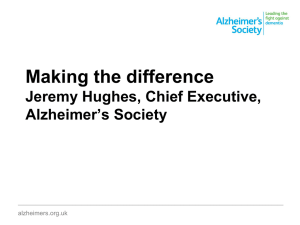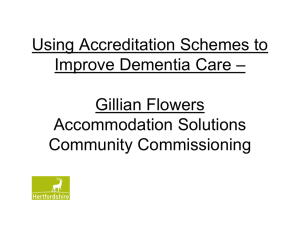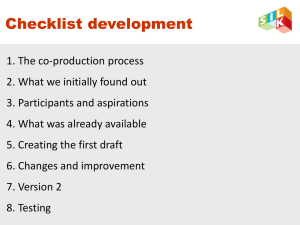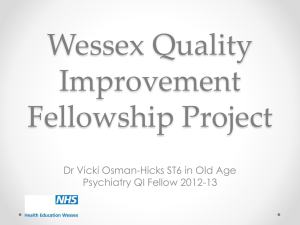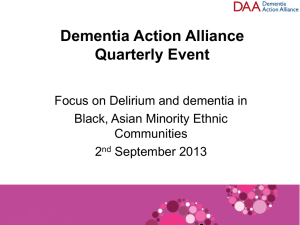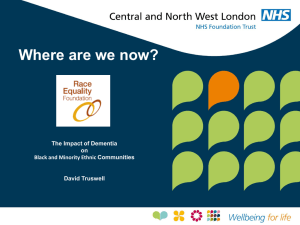point 42-44, depending on length,bold Arial
advertisement
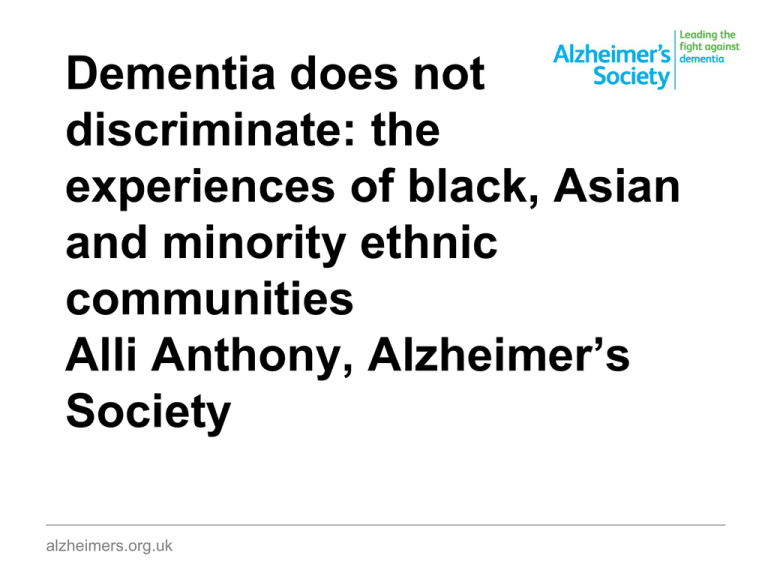
Dementia does not discriminate: the experiences of black, Asian and minority ethnic communities Alli Anthony, Alzheimer’s Society ________________________________________________________________________________________ alzheimers.org.uk All party parliamentary group on dementia • 70 MPs and Peers, since 2007 • 2013 inquiry the experiences of people with dementia from black, Asian and minority ethnic groups •Diagnosed late and underrepresented in services •Lots of activity in dementia but is it addressing the needs of the whole UK population? ________________________________________________________________________________________ alzheimers.org.uk New data on increasing numbers • Previous estimate 11,392 (Dementia UK) • Updated estimate for the number of people with dementia from black, Asian and minority ethnic groups in England and Wales (Runnymede Trust and CPA) 2011: 25,000 2026: 50,000 2051: 172,000 ________________________________________________________________________________________ alzheimers.org.uk Barriers to accessing services • • • • • • • • Language and the use of interpreters Cultural views of ageing Lack of awareness of dementia Dementia services not being culturally diverse or not being seen to be so People may not see themselves as carers Stigma and lack of confidentiality Extended family dynamics Short term funding Life history of people with dementia from BAME groups • Many of the challenges faced are similar to those face by the white British population • Some of the causes are different and require a different response • The impact of life history - we all have our unique life history that makes us who we are today – where we are born, what we eat, the language we speak, work, our family life – supporting this in someone with dementia ________________________________________________________________________________________ alzheimers.org.uk Recognising diversity within ethnic groups • Risk of blanket response and important to recognise immense diversity • Always important to acknowledge and respond to the differences within ethnic groups, and at an individual level, ensure a person centred approach is taken. • But the term BAME does focus attention on groups that share a similar experience ________________________________________________________________________________________ alzheimers.org.uk Awareness and stigma • • • There are strong associations with “getting old” or mental illness There is no term for dementia in South Asian languages Amongst the Chinese, the term to describe dementia is very derogatory “This disease never existed in our community. Nobody would think this is a health problem. People in my community would say the person has gone mad or lost his mind” (Pakistani carer) “Chinese word for dementia is really bad. It’s like “crazy” or “100% docile” or “nutty”. The term is used in an insulting way. It’s very negative” (Chinese service provider) “I often hear in my community that somebody has done something to her like cast an evil spell” (Caribbean service provider) “A lot of people say to me this doesn’t happen in the Caribbean. It is only since we came to this country that you hear about such mental problems” (Caribbean service provider) “If someone has dementia the family will become very isolated. Only the very close family members will know about it. They will hide it from other family members of friends” (Chinese service provider) “This is a time-bomb. We need to tell our communities that dementia is nothing to be ashamed of. We need to develop the right services and tell people about them” (South Asian service provider) Impact of low levels of awareness and myths Delays in getting a diagnosis and accessing services are significant risks “People will only take action when the conditions get worse and they are in the deep end.” (Asian service provider) “If someone has dementia the family will become very isolated. Only the very close family members will know about it. They will hide it from other family members or friends.” ________________________________________________________________________________________ alzheimers.org.uk Lack of culturally sensitive services • Support available does not always address needs relating to faith or culture “We just sat there on our own all day. Other people were dancing and singing. We had a cup of tea and in the evening they dropped us home. There was no one there we could talk to” (Indian carer) ________________________________________________________________________________________ alzheimers.org.uk Opportunities for providing support • Large ethnic minority voluntary sector providing health and welfare support • Benefits of linking ethnic minority community groups and local specialist dementia services • Specialist ethnic minority dementia services • Making small changes to a mainstream service ________________________________________________________________________________________ alzheimers.org.uk APPG Recommendations • Government funded awareness programme • Undertaking preventative work • Ensure local areas are aware of the need to support people with dementia from BAME groups in their communities • Sharing good practice in commissioning and support • Improve access to high quality support (sharing knowledge) • Alzheimer’s Society programmes • Improving staff knowledge and skills ________________________________________________________________________________________ alzheimers.org.uk Follow up • Seeking meetings with organisations to whom recommendations are directed • We will be writing to directors of public health and CCG chairs • Working on how to involve Alzheimer’s Society campaigners network • How else can we turn the report into a reality? ________________________________________________________________________________________ alzheimers.org.uk Dementia can affect us all – over to you!




